After Cyclone Idai: Finding Hope in Mozambique
By Hsiao Yiu-hwa (蕭耀華)
Abridged and translated by Syharn Shen (沈思含)
Rosalind Chang (張薰云)
After Cyclone Idai: Finding Hope in Mozambique
By Hsiao Yiu-hwa (蕭耀華)
Abridged and translated by
Syharn Shen (沈思含)
Rosalind Chang (張薰云)
Weeping with tears as she recalls the time when Cyclone Idai made landfall, Ines Joao said that the storm lasted for hours, and in a short time, the vast land before her was completely swamped. Amid howling winds and cries from people and animals alike, her house was gone. Together with her family of seven and her neighbors, Ines took up shelter by the roadside and often had to endure days without food.
Ines' experience is not an exception, but part of a reality faced by countless survivors of Cyclone Idai.
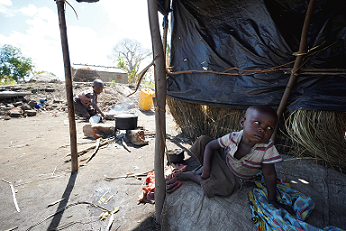
In the aftermath of Cyclone Idai, many local residents who have lost everything must start their lives all over again.
Tropical Cyclone Idai Batters Mozambique
In March 2019, an intense tropical cyclone hit East Africa, leaving a trail of destruction in Mozambique, Zimbabwe, and Malawi. Formed on March 4, Cyclone Idai made landfall in Mozambique in early March, headed east towards the Mozambique Channel, and then returned to make a second landfall in mid-March.
In Mozambique, the cyclone took more than 600 lives, injured over 1,000 people, destroyed schools, damaged tens of thousand of houses, and affected more than 1.85 million people. In the country's second largest city, Beira, where Idai made its second landfall, roads, power, and communications were mostly cut off as power lines had crashed and the roads were submerged in water. The disaster also flooded more than 700,000 hectares of agricultural land, causing a severe shortage of food and leaving local residents in dire need of aid.
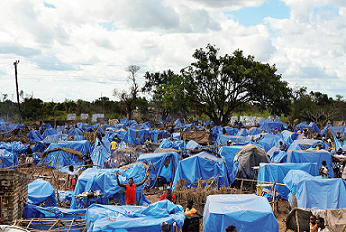
After the disaster, people living in the lower areas had to leave their homes and stay in makeshift tents set up in a higher location by the road.
In the wake of the disaster, under the instruction of Dharma Master Cheng Yen (證嚴法師), Tzu Chi volunteers in Mozambique immediately mobilized to carry out disaster relief. On March 20, Tzu Chi volunteers headed out in two routes toward the disaster-hit areas. A local volunteer flew directly from the capital, Maputo, to the port city of Beira to survey the disaster. A group of volunteers took another route by driving northbound from Maputo with bags of rice, covering more than 1,000 kilometers of muddy and damaged roads till they arrived at the worst-hit areas in the provinces of Sofala and Manica. Before the end of March, rice and emergency supplies have been distributed to the cyclone survivors.
In early April, more than 2,000 bags of supplies which have been packed in Tzu Chi's office in Maputo arrived at Nhamatanda of Sofala Province in large trucks. With each weighing 36 kilos, each bag of supplies for the affected residents contained salt, corn flour, beans, cooking oil, soap, mosquito nets, and water purification solution.
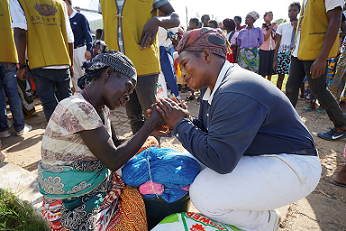
A Tzu Chi volunteer comforts a woman at an aid distribution site.
A Ray of Light on a Devastated Land
With near-complete destruction in the severely-hit areas, the disaster relief work was met with significant challenges. Volunteers on their way to provide aid often had to get out of their cars to push the cars out of the mud. The heavy winds and rains also burst the banks of Buzi River in central Mozambique, which flooded vast expanses of farmland, destroyed crops, and caused a food crisis. Before Tzu Chi volunteers arrived at the disaster-stricken areas, it is said that the locals had nothing to eat for two weeks but a very thin soup made from a single cup of beans cooked in a large pot of water, which was then shared among dozens of people.
As Tzu Chi's disaster relief team was on their way to Nhamatanda, they had to stop in the middle of the road and wait for cars from the other direction to pass. Since parts of the road were completely destroyed by the floods, there was a 10-kilometer section that could only offer one-way traffic. As the cars waited, a barefoot limping old man who supported himself with a cane made from a tree branch approached them.
He slowly made some gestures and feebly spoke a few words, asking if there was anything for him to eat. There was a trace of expectation in the old man's dispirited eyes. Someone on a Tzu Chi relief team's car shared with the old man the little food that he had. When the cars finally started to move, the barefoot old man remained on the sun-scorched road, seeing them off.
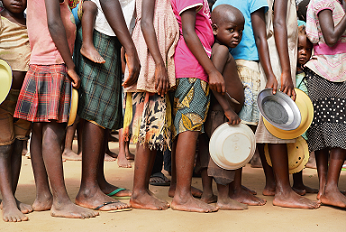
Locals affected by Cyclone Idai line up to receive hot meals.
The heavy rains and floods brought by Cyclone Idai left disaster areas with only standing water for more than a month, which bred mosquitoes and worsened hygienic conditions. The pockets of water, seemingly beautiful from a distance, emanated a foul stench that could be smelled when one went near them. With little access to clean water, the locals extract groundwater to use, but as contaminated water had flowed underground, a cholera epidemic broke out, leading to more than 1,000 confirmed cases and at least 3 deaths.
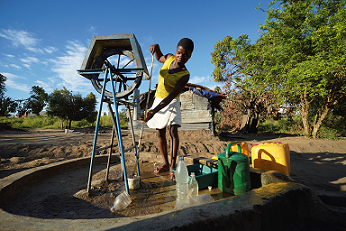
A young villager fetches groundwater in Tica village, Sofala Province. |
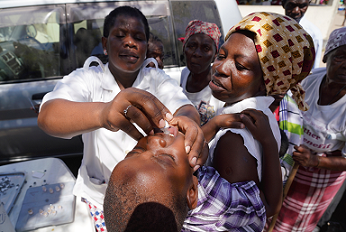
A child receives an oral cholera vaccine at a local hospital in Sofala Province. |
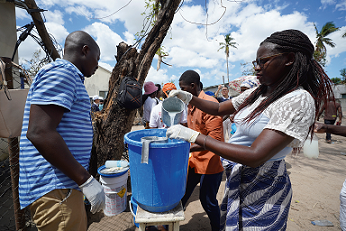
The local government distributes water purification solution to the public, hoping to hinder the spread of the cholera epidemic. |
Oral vaccines were immediately provided by international health organizations, and the local government called on the locals to be vaccinated with the hope of controlling the cholera outbreak.
Furthermore, as the deadly cyclone submerged vast expanses of agricultural land and destroyed crops, a food crisis is well underway.
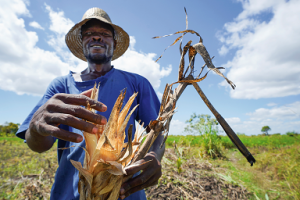
With a dead ear of corn in his hands, Cordeiro describes the destruction that the cyclone brought.
In the middle of a devastated farmland stood forty-one-year-old Cordeiro, who was surrounded by dead corn plants drowned by the floods. With a hoe, he dug small holes in the ground. His mother and wife were by his side with several corn cobs in their hands, picking the few corn kernels that were still good and dropping them into the holes. With their bare feet, they covered the holes with soil. This is how the locals plant their corn.
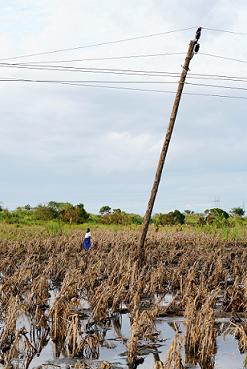
A land with destroyed maize crops in Tica village, Sofala Province.
Originally, this was not the season to plant crops as a maize harvest was to be expected shortly. But as Cyclone Idai struck, it remained for more than 10 hours in the village, bringing down a large tree and inundating the entire field. Rising as high as 1.5 meters, the floodwaters remained for a week and destroyed all the corn crops that could have been harvested shortly.
After the floods receded, Cordeiro, his mother, and his wife immediately began planting in their land again, hoping to minimize losses and shorten the period of no harvest. Even in times without disaster, experts have pointed out that it is not easy to have stable food production in the rural areas of Sofala Province. So, with the destruction brought by Idai, the already difficult livelihoods of the local people have only turned for the worse. And as no crops are left to be harvested, it is expected that food prices will skyrocket.
With Love, There is Hope
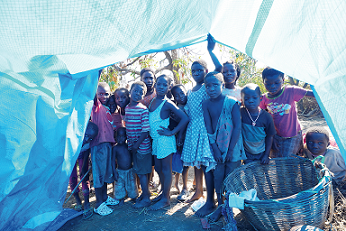
With school suspended after the disaster, children wander about and look into a tent with curious eyes. The education of local children is also an issue waiting to be resolved.
After Cyclone Idai passed, the coastline of the city of Beira has reemerged. Calm waves lap on the shore, and the warm sunset has turned the sky and the land golden. Three young locals idled by the beach, which has become their place to stay overnight after the disaster hit.
Amid widespread loss and destruction brought by one of the worst natural disasters in Mozambique, there is still hope, as optimism runs in the blood of the local people. In a center in Mahotas, Maputo, about 500 people—mostly women—worked hard to prepare and pack supplies for those in need. As they worked, they laughed, sang, and even danced at times. Passersby might have wondered about the seemingly lively party there.
Yet the truth is, these local people have toiled day and night for more than a week, and will continue to do so for quite a while. Without receiving any pay, these people who are so willing to give of themselves are Tzu Chi volunteers in Mozambique, working hard to pack and prepare 5,000 bags of supplies—each bag weighing more than 30 kilos—to be sent to people in need 1,000 kilometers away.
With the selfless giving of these local volunteers as well as love and care from people all around the world, hope can be found in Mozambique again.
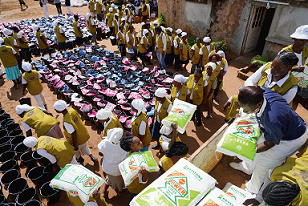
At Tzu Chi's office in Mozambique, which is located in Maputo, local volunteers worked day and night to pack and load supplies for the cyclone survivors in central Mozambique.
The heavy rains and floods brought by Cyclone Idai left disaster areas with only standing water for more than a month, which bred mosquitoes and worsened hygienic conditions. The pockets of water, seemingly beautiful from a distance, emanated a foul stench that could be smelled when one went near them. With little access to clean water, the locals extract groundwater to use, but as contaminated water had flowed underground, a cholera epidemic broke out, leading to more than 1,000 confirmed cases and at least 3 deaths.

A young villager fetches groundwater in Tica village, Sofala Province.

A child receives an oral cholera vaccine at a local hospital in Sofala Province.

The local government distributes water purification solution to the public, hoping to hinder the spread of the cholera epidemic.
Oral vaccines were immediately provided by international health organizations, and the local government called on the locals to be vaccinated with the hope of controlling the cholera outbreak.
Furthermore, as the deadly cyclone submerged vast expanses of agricultural land and destroyed crops, a food crisis is well underway.

With a dead ear of corn in his hands, Cordeiro describes the destruction that the cyclone brought.
In the middle of a devastated farmland stood forty-one-year-old Cordeiro, who was surrounded by dead corn plants drowned by the floods. With a hoe, he dug small holes in the ground. His mother and wife were by his side with several corn cobs in their hands, picking the few corn kernels that were still good and dropping them into the holes. With their bare feet, they covered the holes with soil. This is how the locals plant their corn.

A land with destroyed maize crops in Tica village, Sofala Province.
Originally, this was not the season to plant crops as a maize harvest was to be expected shortly. But as Cyclone Idai struck, it remained for more than 10 hours in the village, bringing down a large tree and inundating the entire field. Rising as high as 1.5 meters, the floodwaters remained for a week and destroyed all the corn crops that could have been harvested shortly.
After the floods receded, Cordeiro, his mother, and his wife immediately began planting in their land again, hoping to minimize losses and shorten the period of no harvest. Even in times without disaster, experts have pointed out that it is not easy to have stable food production in the rural areas of Sofala Province. So, with the destruction brought by Idai, the already difficult livelihoods of the local people have only turned for the worse. And as no crops are left to be harvested, it is expected that food prices will skyrocket.
With Love, There is Hope

With school suspended after the disaster, children wander about and look into a tent with curious eyes. The education of local children is also an issue waiting to be resolved.
After Cyclone Idai passed, the coastline of the city of Beira has reemerged. Calm waves lap on the shore, and the warm sunset has turned the sky and the land golden. Three young locals idled by the beach, which has become their place to stay overnight after the disaster hit.
Amid widespread loss and destruction brought by one of the worst natural disasters in Mozambique, there is still hope, as optimism runs in the blood of the local people. In a center in Mahotas, Maputo, about 500 people—mostly women—worked hard to prepare and pack supplies for those in need. As they worked, they laughed, sang, and even danced at times. Passersby might have wondered about the seemingly lively party there.
Yet the truth is, these local people have toiled day and night for more than a week, and will continue to do so for quite a while. Without receiving any pay, these people who are so willing to give of themselves are Tzu Chi volunteers in Mozambique, working hard to pack and prepare 5,000 bags of supplies—each bag weighing more than 30 kilos—to be sent to people in need 1,000 kilometers away.
With the selfless giving of these local volunteers as well as love and care from people all around the world, hope can be found in Mozambique again.

At Tzu Chi's office in Mozambique, which is located in Maputo, local volunteers worked day and night to pack and load supplies for the cyclone survivors in central Mozambique.
Contact Us | Plan a Visit | Donate
8 Lide Road, Beitou 11259, Taipei, Taiwan
886-2-2898-9999
005741@daaitv.com
©Tzu Chi Culture and Communication Foundation
All rights reserved.
